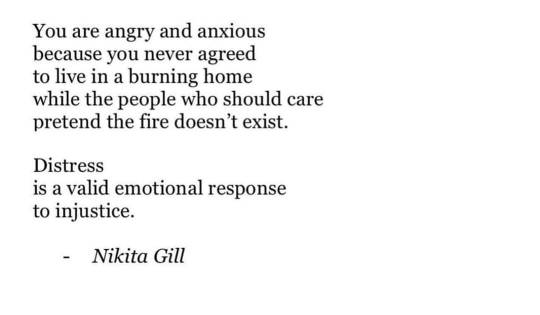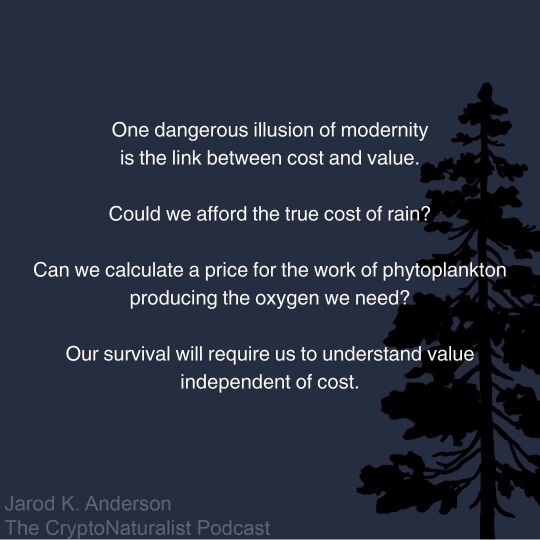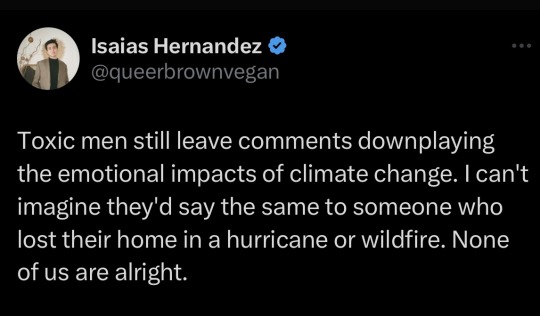#climate anxiety
Text
Since the 1960s, the world has seen a spike in the number of natural disasters, largely due to rising sea levels and an ever gradually increasing global surface temperature.
The good news? We’re getting better at helping each other when disasters strike.
According to a recent study from Our World In Data, the global toll from natural disasters has dramatically dropped in the last century.
“Low-frequency, high-impact events such as earthquakes and tsunamis are not preventable, but such high losses of human life are,” wrote lead authors Hannah Ritchie and Pablo Rosado.
To conduct their research, Ritchie and Rosado gathered data from all geophysical, meteorological, and climate-related disasters since 1900. That includes earthquakes, volcanic activity, landslides, drought, wildfires, severe storms, and mass floods.
In the early-to-mid 20th century, the average annual death toll from disasters was very high, often climbing to over a million.
For example, the study cites that in 1931, 2.7 million people died from the Yangtze–Huai River floods. In 1943, 1.9 million died from the Bangladeshi famine of 1943. Even low-frequency events had extreme death tolls.
“In recent decades we have seen a substantial decline in deaths,” Ritchie and Rosado observed. “Even in peak years with high-impact events, the death toll has not exceeded 500,000 since the mid-1960s.”
Why has the global death toll from disasters dropped?
There are a number of factors at play in the improvement of disaster aid, but the leading component is that human beings are getting better at predicting and preparing for natural disasters.
“We know from historical data that the world has seen a significant reduction in disaster deaths through earlier prediction, more resilient infrastructure, emergency preparedness, and response systems,” Ritchie and Rosado explained in their study.
On April 6, [2024],a 7.2 magnitude earthquake rocked the city of Hualien in Taiwan. Days later, as search and rescue continues, the death toll currently rests at 16.
Experts have praised Taiwan for their speedy response and recovery, and attributed the low death toll to the measures that Taiwan implemented after an earthquake of similar strength hit the city 25 years earlier. Sadly, on that day in 1999, 2,400 people died and 11,000 were injured.
In an interview with Al Jazeera, Wang Yu — assistant professor at National Taiwan University — said that event, known as the Chi-Chi earthquake, revolutionized the way Taiwan approached natural disasters.
“There were lots of lessons we learned, including the improvement of building codes, understanding earthquake warning signs, the development and implementation of earthquake early warning (EEW) systems and earthquake education,” said Wang.
Those same sensors and monitoring systems allowed authorities to create “shakemaps” during Hualien’s latest earthquake, which helped them direct rescue teams to the regions that were hit the hardest.
This, in conjunction with stronger building codes, regular earthquake drills, and public education campaigns, played a huge role in reducing the number of deaths from the event.
And Taiwan’s safeguards on April 6 are just one example of recent measures against disasters. Similar models in strengthening prediction, preparedness, and recovery time have been employed around the world when it comes to rescuing victims of floods, wildfires, tornados, and so on.
What else can we learn from this study?
When concluding the findings from their study, Ritchie and Rosado emphasized the importance of increasing safety measures for everyone.
Currently, there is still a divide between populations with high gross national income and populations living in extreme poverty.
Even low-income countries that infrequently have natural disasters have a much higher death rate because they are vulnerable to collapse, displacement, and disrepair.
“Those at low incomes are often the most vulnerable to disaster events; improving living standards, infrastructure, and response systems in these regions will be key to preventing deaths from natural disasters in the coming decades,” surmised Ritchie and Rosado.
“Overall development, poverty alleviation, and knowledge-sharing of how to increase resilience to natural disasters will therefore be key to reducing the toll of disasters in the decades to come."
-via GoodGoodGood, April 11, 2024
#good news#hope#climate change#hope posting#climate news#climate crisis#climate anxiety#climate emergency#natural disasters#disasters#earthquake#wildfire#hurricane#cw death#taiwan#tsunamis#building construction#climate action#climate hope
364 notes
·
View notes
Text
"People assume that in the 50 years since the first Earth Day we've made no progress. That we're in a worse position now than we were in the 1970s, that there's no point in environmental action," [...]
Quite the opposite is true. Climate-friendly advances that would have seemed impossible even 10 years ago are now commonplace. And three times in the past 50 years humanity has faced--and fixed--massive, man-made global environmental issues.
The fight isn't won yet, but don't forget that we have made enormous progress.
We would be in a much, much worse position if it wasn't for all the incredible work of environmental activists who came before us, most of whose names and contributions we will never know. They are the reason that we have a fighting chance now, and we owe it to them to pick up their banner and keep running.
#earth day#climate change#environment#global warming#hope#climate anxiety#climate grief#ecoanxiety#ecogrief
1K notes
·
View notes
Text
am I buying dolphin safe tuna? am I buying bat safe tequila? am I buying orangutan safe candy? am I buying bird safe windows? am I buying coral safe sunscreen? am I
788 notes
·
View notes
Text
Some Jewish environmentalist questions I've been thinking of lately....
How can we commemorate the Festival of Spring (Pesach) in its proper time if climate change is changing the onset of the seasons?
How can we ask Hashem for rain when the rainy season is now the devastating floods and hurricanes season?
How can we determine the end of Shabbat without a clock, if light pollution means we can't see even three stars?
How can we bless the new moon through smog?
How can we bless the budding of new fruit in its proper time, if fruit trees aren't budding in their time?
How can we thank Hashem for rain when the rain that falls is toxic?
[goyim can reblog but don't add]
#jews feel free to add on to this#jumblr#judaism#jewish environmentalist#environmentalism#climate anxiety#if jew know jew know#climate change
929 notes
·
View notes
Text

We need more hope-keepers in the climate justice movement. More people who hold evidence-based hope in their hands that celebrate the continued momentum and progress that is being done. Because without them, who would we lean on in times of despair?
-qbv
#queerbrownvegan#sustainability#climate change#climate justice#activism#social justice#mental health#environmentalism#intersectionality#climate anxiety#ecoanxiety#doomism#hope
712 notes
·
View notes
Note
I'm sorry if this is bleak, but I'm very scared about climate change. Is there any sort of hope at this point or are we all just waiting to starve to death? :(
There is always hope. There is always possibility.
Life has clung on to this little spherical rock for 4.6 billion years and has survived unimaginable things. Life will survive this, too.
We have to work together. We have to realize we are all one biosphere, one planet, one people. And work together.
And that kind of change starts with each one of us, in extending more empathy and compassion to each other and to nature, and fighting for what's right.
tldr do the work you can do. it'll help.
428 notes
·
View notes
Text

#constructive anger#activism fatigue#compassion fatigue#current events#climate crisis#climate anxiety#self compassion#your feelings are valid#generational trauma#mental health#feelings#emotions
280 notes
·
View notes
Text

One dangerous illusion of modernity
is the link between cost and value.
Could we afford the true cost of rain?
Can we calculate a price for the work of phytoplankton producing the oxygen we need?
Our survival will require us to understand value
independent of cost.
129 notes
·
View notes
Text
Bearing witness to the climate crisis can feel surreal at times, yet I do not mention this to my client. I have a job to do, and it is not to escalate their rational anxieties and fears, it is to manage what is manageable; to teach coping strategies, to encourage connection to nature and social relationships, to channel their grief into sustainable action that feels meaningful. ...
I constantly return to the message that there is so much beauty and life in the world that can be saved - and is absolutely worth fighting for. I encourage people to curate their social media feeds and to seek out good news stories about the climate action around the world. I get them to envision a world that is fair; where everyone has enough resources to meet their needs. I ask them what they can do now to contribute to this world, and ask them to move towards this.
I talk to them about connection with like minded peers, and joining a local climate action group. I talk to them about nature based therapies- hiking, swimming, listening and watching wildlife, attending beach clean ups and tree planting days. I talk to them about choosing financial institutions to bank with that rule out funding fossil fuel projects. I encourage mindfulness, enjoying the present moment, working through their grief through art, and working through their stress, rage and anxiety with movement.
107 notes
·
View notes
Text
Anybody else completely unable to enjoy warm fall weather because it’s just a reminder of the progress of climate change? Because yeah, when I was little, our autumn weather was much cooler.
#climate change#climate crisis#climate emergency#global climate change#warm weather#fall#autumn#climate anxiety#global warming#weather#temperature#environmentalism#environmental activism#save the earth#protect the earth#leftblr#leftist#communist#socialist#communism#socialism#anti capitalist#anti capitalism#leftist politics#human rights
118 notes
·
View notes
Text
Holy crap, I didn't think Biden would be able to get the Climate Corps established without Congress. This is SUCH fantastic news.
--
"After being thwarted by Congress, President Joe Biden will use his executive authority to create a New Deal-style American Climate Corps that will serve as a major green jobs training program.
In an announcement Wednesday, the White House said the program will employ more than 20,000 young adults who will build trails, plant trees, help install solar panels and do other work to boost conservation and help prevent catastrophic wildfires.
The climate corps had been proposed in early versions of the sweeping climate law approved last year but was jettisoned amid strong opposition from Republicans and concerns about cost.
Democrats and environmental advocacy groups never gave up on the plan and pushed Biden in recent weeks to issue an executive order authorizing what the White House now calls the American Climate Corps.
“After years of demonstrating and fighting for a Climate Corps, we turned a generational rallying cry into a real jobs program that will put a new generation to work stopping the climate crisis,” said Varshini Prakash, executive director of the Sunrise Movement, an environmental group that has led the push for a climate corps.
With the new corps “and the historic climate investments won by our broader movement, the path towards a Green New Deal is beginning to become visible,” Prakash said...
...Environmental activists hailed the new jobs program, which is modeled after the Civilian Conservation Corps, created in the 1930s by President Franklin D. Roosevelt, a Democrat, as part of the New Deal...
Lawmakers Weigh In
More than 50 Democratic lawmakers, including Massachusetts Sen. Ed Markey and New York Rep. Alexandria Ocasio-Cortez, had also encouraged Biden to create a climate corps, saying in a letter on Monday that “the climate crisis demands a whole-of-government response at an unprecedented scale.”
The lawmakers cited deadly heat waves in the Southwest and across the nation, as well as dangerous floods in New England and devastating wildfires on the Hawaiian island of Maui, among recent examples of climate-related disasters.
Democrats called creation of the climate corps “historic” and the first step toward fulfilling the vision of the Green New Deal.
“Today President Biden listened to the (environmental) movement, and he delivered with an American Climate Corps,” a beaming Markey said at a celebratory news conference outside the Capitol.
“We are starting to turn the green dream into a green reality,” added Ocasio-Cortez, who co-sponsored the Green New Deal legislation with Markey four years ago.
“You all are changing the world,” she told young activists.
Program Details and Grant Deadlines
The initiative will provide job training and service opportunities to work on a wide range of projects, including restoring coastal wetlands to protect communities from storm surges and flooding; clean energy projects such as wind and solar power; managing forests to prevent catastrophic wildfires; and energy efficient solutions to cut energy bills for consumers, the White House said.
Creation of the climate corps comes as the Environmental Protection Agency launches a $4.6 billion grant competition for states, municipalities and tribes to cut climate pollution and advance environmental justice. The Climate Pollution Reduction Grants are funded by the 2022 climate law and are intended to drive community-driven solutions to slow climate change.
EPA Administrator Michael Regan said the grants will help “communities so they can chart their own paths toward the clean energy future.”
The deadline for states and municipalities to apply is April 1, with grants expected in late 2024. Tribes and territories must apply by May 1, with grants expected by early 2025."
-via Boston.com, September 21, 2023
#climate change#climate crisis#climate anxiety#climate news#climate corps#biden#biden administration#democrats#voting matters#congress#environmental activism#environmental protection agency#environmental justice#climate activism#united states#us politics#good news#hope#hope posting#green jobs#hope punk#seriously this is SUCH a huge deal#climate hope#green energy#disaster preparedness#natural disasters#ecosystem restoration
6K notes
·
View notes
Text
#clean energy#green energy#sustainability#climate change#environment#good news#hope#climate anxiety#fossil fuels
736 notes
·
View notes
Text
crazy how we’re watching our beautiful planet being destroyed by evil maniacs and we’re j supposed to go to school and work normally as if this isn’t such a uniquely maddening form of radicalisation
#i feel like i’m going insane#nothing else matters#why does no one care#climate change#global warming#save our planet#climate crisis#climate emergency#climate activism#climate anxiety#the horrors#ramblings of a madman 🪵#mother earth#aaaahhhh
75 notes
·
View notes
Quote
When consumers are told they are equally to blame for the climate crisis (a narrative conveniently crafted by the fossil fuel industry) but face a dearth of options for actually leading a more climate-friendly life, it’s all too easy to convince people to feel guilty merely for living.
The New Republic
476 notes
·
View notes
Text

None of us are alright and the idea that climate anxiety is a sign of weakness disregards our most basic sense of empathy.
qbv
#queerbrownvegan#sustainability#climate change#environmentalism#social justice#environment#climate crisis#environmental justice#activism#intersectional environmentalism#mental health#climate anxiety#eco anxiety
56 notes
·
View notes
Text
in the past 30 days, ~5,000 heat and rainfall records have been broken or tied in the united states and more than 10,000~ records set globally
texas cities and towns alone have set 369 daily high temperature records since june 1st.
since 2000, the u.s. has set about twice as many records for heat as those for cold.
this is not just "one heatwave". this is the beginning of the culmination of our decades of unchecked hubris and ongoing rape of the natural world.
we have fucked around.
we are finding out.
95 notes
·
View notes